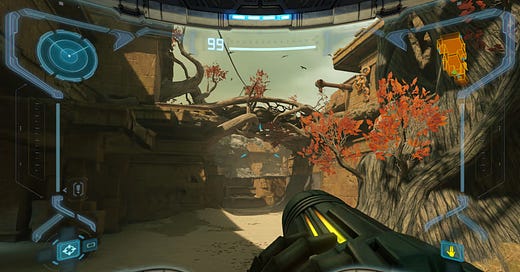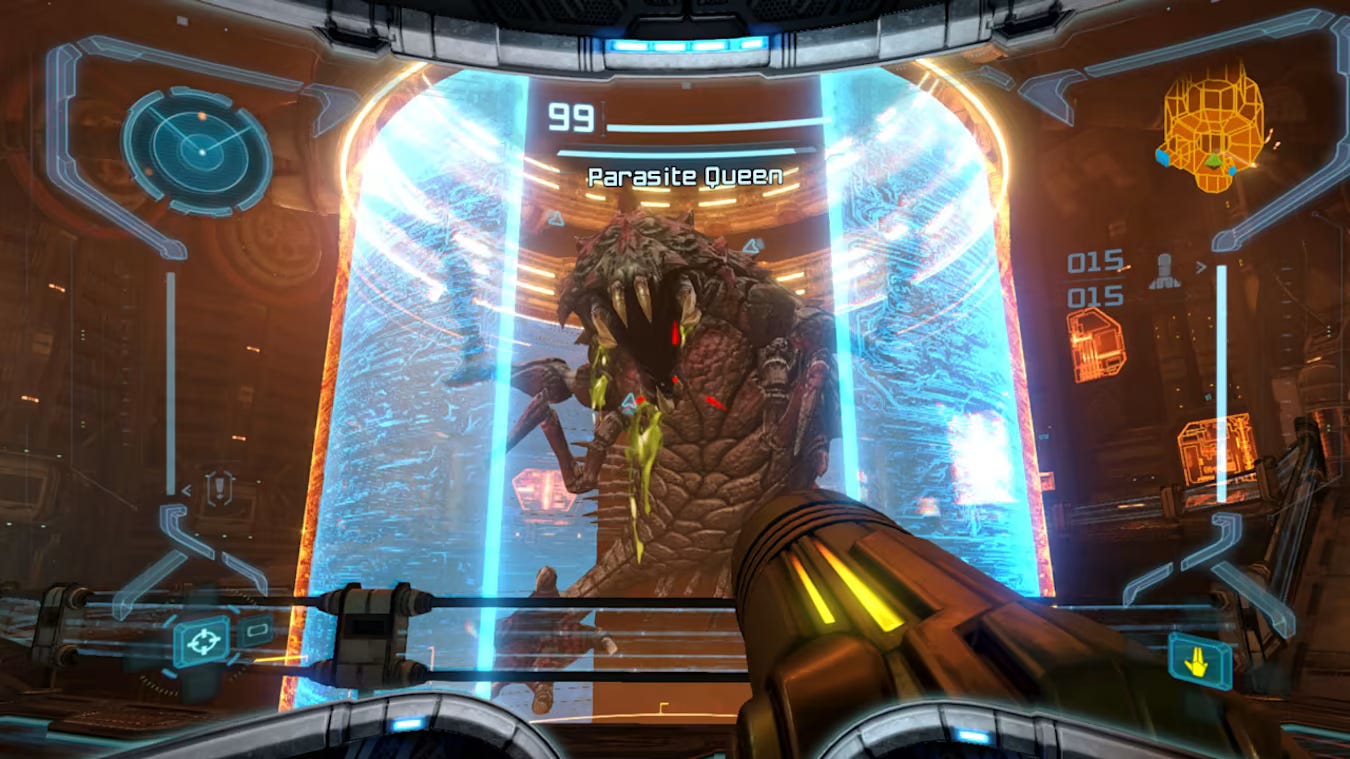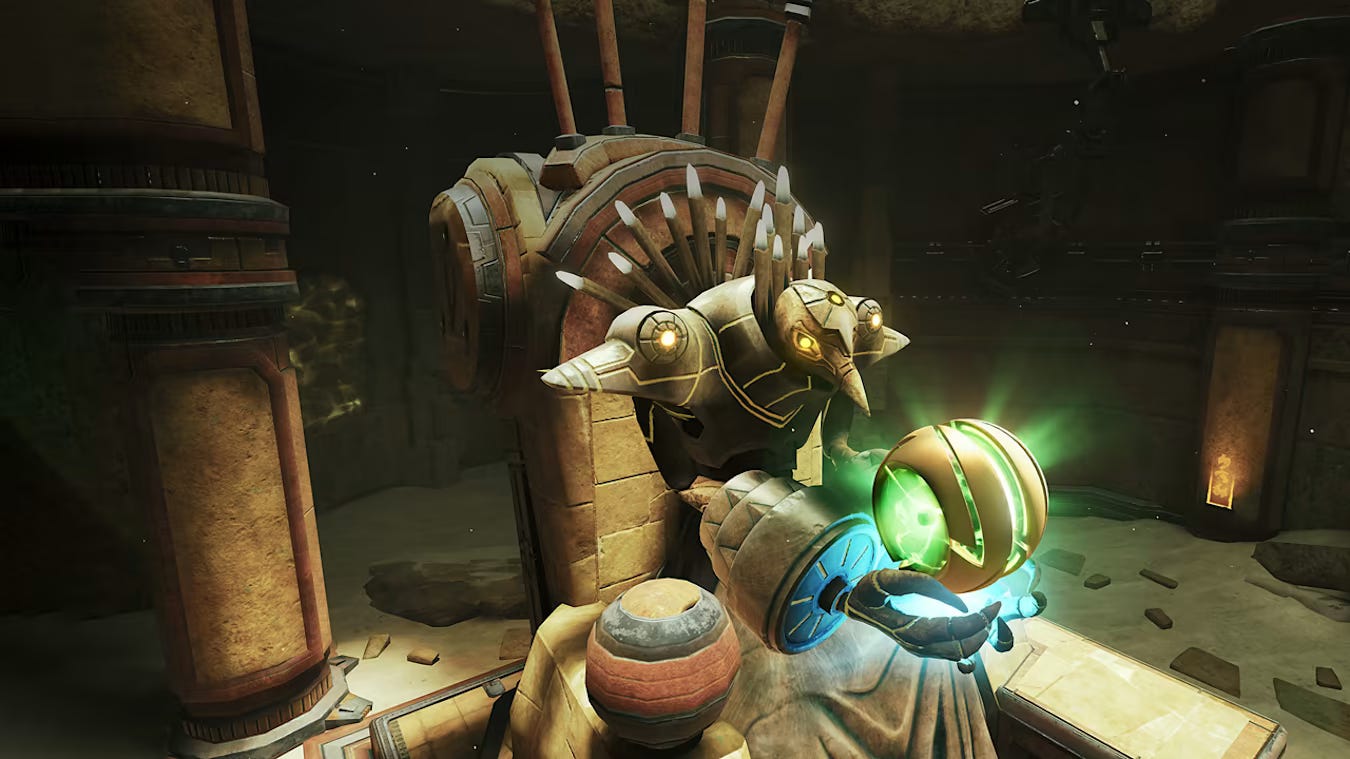I don’t want Metroid Prime 4: Beyond to be more of the same.
A pretty hot take, I know. People love Metroid for a variety of reasons, with some of those reasons proving so addictive and engrossing that they became the namesake for a larger genre: the Metroidvania. Even I can admit, I’d be lying if I said I didn’t want Metroid Prime 4 to be at least a bit similar to Metroid Prime. But I’d be pretty disappointed if this next installment in this spinoff series [Metroid Prime 2: E]choes the following formula:
A game about a lone warrior unearthing a scientific experiment gone wrong on a puzzle-box, mostly-derelict planet, whereupon you fire your cannon arm and fit into a bunch of conveniently-sized tubes as you encounter mutated monstrosities, disturbed ghosts, and a literal seed that ties into the roots of a larger trilogy.
The first time I experienced Metroid Prime- and the reason I use the word “experienced” - I wasn’t even playing the game. I watched my older brother play the majority of it on our living room CRT television. Even as a backseat player, Metroid Prime was incredibly immersive. It appealed to me because of its novelesque structure: seeing Samus’ reflection in her visor when a particularly strong energy blast reveals it was like being invited to peer into the private experiences of an individual. In watching my brother grapple with- and grapple through- the environments of the game, their layouts became seared in my brain, to the extent that, when he returned to play the trilogy collection on my Wii U in 2016, I was able to remind him of minor details and objectives as he moved from one environment to the next. He was surprised by this, but I guess he didn’t really realize how much I idolized him and the game he was playing.
If you’re aware of pop culture timelines, you know that the Prime trilogy came out around the same time as the second Star Wars trilogy, which unfortunately left my brother and I wanting for good sci-fi. This is something that I, at least, would eventually find in the Prime games. Similarly, the third Star Wars trilogy was also just starting in 2016, and in turn this pop culture maelstrom was partially the impetus for this latest revisit to the Prime trilogy. It was mainly an event driven by the brotherly camaraderie that nostalgia provides, as our tastes had diverged in the years since Metroid Prime’s release. I found myself more immersed in the fantasy of art, theatre, and video games, while he became more concerned with the realities and imperfections of the world in politics, charity, and music. Our kinship- bound by blood, shared living space, and all the other socioeconomic trappings of the world- had remained a constant, but it had also dulled over time and space. When getting together at family events, we would default to the common grounds that our cohabitant years had forged: our love of Seinfeld, Roller Coaster Tycoon, Redwall, and sometimes, occasionally, the odd reference to Metroid Prime. This revisit would be a dreamy, breezy return to our youth, and also the last one we would ever share.
It was a very emotional experience completing the Nintendo Switch HD Remaster of the game around its release in February 2023. The game was largely just as good from a design perspective as I remembered, which is always a validating experience. It was also the first time I had played a Metroid Prime game since my brother passed away, and in that sense, it felt like a bit of closure, a chapter from our shared story seen through to the end. Even if the rumored Metroid Prime 4 never came to pass, I was happy to have returned to this game that we loved so much…
…And then, of course, the trailer for Metroid Prime 4: Beyond was shown. And while the reality of a new Metroid Prime was exciting, it left me with a number of mixed emotions.
In sharing this background on my experience, I am of course hoping to establish an empathetic perspective, but I’m also aiming to make a point that is larger than my personal experience, as I won’t equate my nostalgia with the overall quality of the Metroid franchise or its merit within the medium. The timely nature of video game discussion means that, while I’ll be able to share my impressions with my contemporaries and maybe even make another piece of writing on the subject down the line, I’ll never be able to share those thoughts and feelings with my brother. It also makes me wonder why I would want to share my feelings:
To have my perspective on the overall quality of a product validated
To experience a sense of community, or belonging
To express deeper truths about the merits of the medium
To express deeper truths about the human experience
I love video games because of the enjoyment and community they’ve brought to my life, whether through challenge or confrontation. I also think that, as is the case with any fairly-new medium, the way we discuss the merits and quality of these artifacts is still in its adolescence. We use number scales and delineations that are judgments of quality when the categories are vague and inauthentic. It’s not my place to knock the performance or quality of the textures in a video game, but as an English teacher, I can look at the formal elements of the narrative and how gameplay empowers them in evaluating their artistic merit. For example, Metroid Prime fortunately released at a time in which polygonal models and textures could successfully evoke a certain degree of realism, which heightens the game’s intimate and vulnerable nature in a science fiction environment, which does not necessarily need to adhere to total graphical realism. That literal moment of reflection wouldn’t be as impactful without this degree of graphical fidelity, which the remaster only needs to enhance slightly.
And of course, especially in the age of information- or disinformation, your choice- it feels fulfilling to have your views validated. Metroid Prime is one of the more celebrated titles in the history of the medium, so it’s no great feat to say “it was good.” It would be lovely to feel a sense of community or belonging as a result of video game discourse, and that can happen at multiple levels. As a writer at a community video game news site for a few years, it was eye-opening to collaborate with other people who loved the medium enough to review and write content for free- even if my esoteric perspectives on video games weren’t always accepted or appreciated. It is also sometimes nice to go on message boards to check my own degree of video game privilege, as you’re likely to encounter people who are way more- and way less- invested in critiquing the medium to the same extent. And there’s the community that comes with family, and sibling relationships can enhance the discussion of media in a variety of ways. Part of why I enjoyed talking to my brother about Metroid Prime was because we both thought “it was good.”
But I think we as a species crave the validation of community and legitimacy so much that we are willing to default to our gut feelings or fall back on review scores in preference to more nuanced statements like “Metroid Prime fails to capture the freedom of movement and athleticism expressed in 2D Metroid games.”
Of course, that critique might come across as hollow in a vacuum, and the realm of video game discourse, for all its flaws and strengths, often lacks perspective. I didn’t play a 2D Metroid game until I downloaded the NES original on my Wii four or five years after Metroid Prime, and neither did my brother. After completing Metroid Dread, which offered me some of the highest highs I’d ever experienced during my time gaming, I finally understood how Metroid Prime had failed to capture the reckless sense of momentum that can be found in a 2D Metroid. But I can’t go back and tell my brother those things, even if I had played Samus Returns, Super Metroid, Zero Mission, and Metroid Fusion during our 2016 revisit. But the breakneck iteration that exists in this medium leaves little chance for retrospective reflection, unless the individual has a storied experience with a series. Even then, life gets in the way. We are sometimes too exhausted to consider art when our brains are fried by the institutions to which we have been fed. There are plenty of artful works out in the ether that people either misinterpret or refuse to engage with.
One of the greatest strengths of video games as a medium is the way in which it celebrates the agency of the player: while other mediums involve a passive audience, games don’t progress without an active participant. It’s partially why video games appeal to a young audience, speaking to the power of play as a learning and social tool. Not only does the language of video games activate certain skills in a unique and player-motivated format, it encourages players to discuss their experience, share strategies, and comprehend what appeals to them on a deeper level. Or, at least in the case of that last part, it could.
The caveat, and perhaps the reason for their lack of inclusion in school curricula (a personal point of ire), is that the discourse around the medium is timely in nature. We consume, react, and move on to the next product in a world where there is access to heaps of new titles released from week to week. Regardless, the deluge of titles is rooted in the experiences and concepts of an era, and with more and more games on the market, there’s a higher chance that this material discusses topics, cultures, themes, that have a great degree of relevance to people. Sadly, they might not fully appreciate these themes if they don’t have the opportunity to sit with said material. Now, there’s a chance that the industry and the rate of released titles will cool, and we’ll have more time to reflect on the video games being presented to us, but that’s an uncertain future. Or maybe not, depending on what you think of the current state of the industry.
Fortunately, video games can evoke a strong sense of place. I can still vividly recall savoring any sliver of light that danced across the car window while playing Pokemon Silver on a road trip. I remember the emotions I experienced while playing Xenoblade Chronicles through a hurricane in college. And of course, I can remember the awe I felt when I watched my brother play Metroid Prime for the first time. These visceral memories can be revisited on a superficial level, and we can perhaps use them to “sit with” games and ruminate on their merit. Video games by nature are so intimate because of their code: there is a set collection of elements that exist within the game world with a degree of consistency, regardless of how we choose to interact with those elements. Even the most expanse and procedurally generated titles possess this limitation. Ultimately, this is why we return to the media we have already consumed- within the familiarity, we can uncover more nuance. Player agency gives us control over the moments we wish to savor or skip, and in doing so, we can linger in the reverie for as long as we choose. It’s empowering for those who want to recreate a time and place, but it begs the question: why is iteration so rampant in the medium?
For better or worse, the late-capitalist world that we live in has presented such a surfeit of iterative content that we are incessantly reminded of the good old days. This is partially to evoke some sense of comfort in us, but it doesn’t always work this way. I already have Metroid Prime and its faithful remaster to remind me of the days I spent with my brother- would he want things to be the same today? Is it fair for me to ask such a question? I can go back to the Metroid Prime trilogy in order to return to that time, to try to evoke the emotions and comfort and certainty of the past. But like every human being, I am a product of loss and continuation. I have progressed by accepting the lessons I learned from the past, but also by embracing new developments that have come with the steady progression of time.
When I hear the title of the next Metroid Prime, I can’t help but wonder how it will manifest as game design. I know that the series producer has on a previous occasion discussed the possibility of time travel, and I wonder how the Metroid lore and mythos can sustain a concept like this. There are, of course, some staples from the sub-series that we must expect: Samus, Metroids, the first-person perspective, less-linear environmental design, and the scanning function. There are things I don’t want, also- as much as I have enjoyed a number of open world games as of recently, I am not sure I need Metroid Prime to have such expanse environments, especially if it would result in diminished diversity of level design and objective. And by all that is good in this world, I hope there’s not another end-game-victory-lap-key-finding section, either, though that seems to be a foundational element of the original trilogy.
Yet Metroid Prime was a stroke of innovation itself, having been the result of a few mismanaged projects at Retro Studios needing condensing and contextualization that brought Samus into 3D. Some of its design decisions were hailed as remarkably ahead of their time, and upon my playthrough of the remaster, I found myself shaking my head at how cleverly the game was designed. So, maybe Metroid Prime can be the same thing again: perhaps Beyond can lean further into the transhumanist themes of the core Metroid narrative, or maybe take on some more immersive simulation elements that the trilogy hinted at, but never really had the time to foster.
Now, I know it’s absolutely too early to speculate about this sort of thing, and I don’t like to engage in or contribute to that sort of content. Maybe all of this conjecture will be clarified in a few month’s time, and it’s pointless to opine about an uncertain future. Frankly, it’s a bit silly for me to expect anything lofty or profound to come from a fourth installment of a video game series.
But maybe it also isn’t- maybe the only way the medium legitimizes itself is by aiming to encapsulate the human experience with greater clarity. Maybe I’m asking a bit much of Retro Studios, but maybe in some way they have earned the inquest. After all, Metroid Prime has solidified itself in my mind as one of the greatest games ever, regardless of its sentimental value.
My brother was an avid fan of music, in all its forms. I recall, in the Autumn of 2016, I had been listening to the top hits on a radio station during commutes to my teaching internship. I remember bemoaning the quality of the music being played, simply because it was not really my preferred genre. However, my brother was able to appreciate the narrative and production process of this music landscape, regardless of my overall dismissal. It made me better appreciate the degree of thought that could be dedicated to music, and informs my relationship with any medium to this day. His perspective allowed me to enhance my understanding, just as I would hope to do the same for him and with others.
I think the medium of video games is worth exploring from alternative perspectives, particularly those beyond the immediate play experience. I think it is important to consider the narrative of a particular game just as it is important to appreciate the narrative of the medium. So much of the past two decades of games journalism have been a result of its explosion in popularity in a very adolescent market. I think we need to diversify the types of commentary that we offer on games, and in many ways, several shifts over the last decade have given me confidence in that idea. Of course, the dearth and consolidation of games journalism and the adoption of generative AI also threaten this idea. Maybe Metroid Prime 4 could comment on this.
In all the ways that I wished I could have had more conversations with my brother, I desire to have an open and honest discussion about video games with other people, in the hopes that we can further develop the vocabulary, discourse, and appreciation of this medium. Maybe that will involve playing and reviewing Metroid Prime 4, maybe it won’t. There is, of course, a delicate line to toe when discussing the media to which we have a strong emotional investment- or maybe that is also what makes our analysis of such material meaningful. It is only through mindful reflection that we can hope to move beyond. It is the only direction worth heading.





